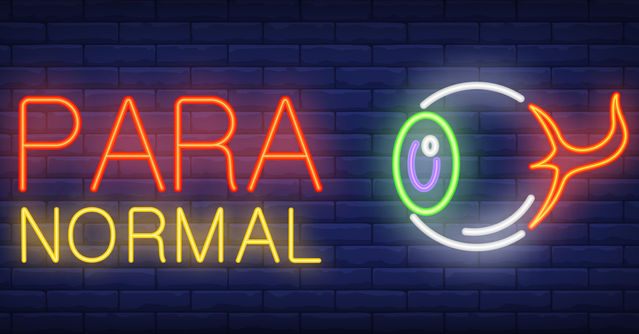Parapsychology
What Is the Allure of the Paranormal in Our Scientific Age?
Many misunderstand science and see more meaning in an imagined paranormal world.
Posted September 17, 2019

I was recently consulted by the parents of a 30-year-old man who had dropped out of a promising career path and stopped job-seeking, spending all his money on an online life coach or guru who is teaching him how to use his mind to influence events remotely.1 He believes he is helping his family achieve financial success and helping in small but meaningful ways to achieve world peace through the focused power of positive thought and meditation. His guru has trained him to achieve this mind-over-matter ability through hundreds of hours of practice over the past few years (the guru’s consulting fees have so far run-up to nearly $100,000 in online credit card charges).
Is this young man delusional? Quite possibly, and we will watch for that, but he could also just be emotionally vulnerable, suggestible and credulous, subscribing to what is quite a popular New Age belief. He is otherwise normal in his appearance, behavior and social interactions. He shows no other signs of psychosis; there could be other explanations for the derailment of his career, and he has no family history of psychotic illness for genetic risk factors.
Sometime before that, an esteemed academic colleague1 astonished me by talking about research he has been doing as a sort of hobby interest (separate from his mainstream scientific work, for which he is regarded as an expert in his field). He is looking for evidence that some individuals can move physical objects at a distance with their minds just by focusing their attention on the desire for the object to move.
How can people hold such weird beliefs in phenomena that have repeatedly been thoroughly debunked by mainstream science? Especially the scientist—how can he be unaware of the mountains of research invalidating the claims for the existence of such phenomena? Apparently he is also unaware that the postulated existence of such paranormal phenomena is utterly incompatible with all the known laws of physics. He must surely be unaware of all this, for if he were aware, he would be deeply embarrassed to be associated with such potentially reputation-damaging research and would fear no longer being taken seriously intellectually by his colleagues. Of course, fear of stigma should not be a reason to refrain from risky research—seen from another point of view some might regard this scientist as highly courageous. Such efforts should rather be judged by the simple fact that paranormal phenomena have been exhaustively and meticulously ruled out by modern science, which has moved on to more productive questions.
Believing is seeing
Repeated surveys have found that more than half of Americans hold at least one paranormal belief2. The idea of the paranormal evidently holds emotional and intuitive appeal for them or some sort of romantic allure. Many people believe they have personally experienced such phenomena, not understanding that subjective experience is among the least reliable forms of evidence: there is a multitude of factors that can distort our perceptions—our brains easily deceive us. And there are powerful cognitive biases that skew how we interpret our perceptions (I have written extensively about all this elsewhere3). Yet, we find our own subjective perceptions arrestingly compelling and are more willing to doubt the laws of physics than to doubt our own minds. People underestimate the capacity of our brains to create their own convincing realities.
What are paranormal phenomena, and what is parapsychology?
Paranormal phenomena are supposedly anomalous or supernatural abilities and events that are claimed to be real though they are not scientifically explainable. The list of purported paranormal phenomena that captivate the popular imagination is long. Examples include various kinds of supposed extrasensory perception (ESP, also referred to as psi) such as mental telepathy—the ability to read another person's thoughts; clairvoyance—the ability to "see" events or objects happening at a distance; precognition—the ability to see the future. Another purported paranormal ability is psychokinesis/telekinesis—the ability to affect objects or events through the power of one’s mind alone, without directly or indirectly physically interacting with them (this is the ability my patient believed he had, and what my colleague was investigating). Other kinds of paranormal beliefs include ghosts, poltergeists, apparitional experiences, life after death, near-death experiences, reincarnation, faith healing, human auras, human energy fields, therapeutic touch (and a whole gamut of other alternative therapies), synchronicity, astrology, alien abductions, and many other beliefs.
Parapsychology is the marginalized, discredited branch of psychology dedicated to the study of paranormal abilities or experiences. Parapsychologists have most often tended to be motivated to try to prove that paranormal phenomena are real.
Thoroughly debunked
Demonstrating that none of these phenomena is real is no longer interesting to most serious scientists, who have generally come to ignore the field and move on. This is because the complete lack of substance and the methodological errors of parapsychological claims have already been demonstrated countless times over the last few decades. And because there is no plausible mechanism by which such phenomena could operate—the basic assumptions of parapsychology fundamentally contradict the foundations and entire accumulated evidence of modern science (the principles of physics that produced the electronics through which this article has been delivered to you would have to be radically wrong for paranormal phenomena to be real, and the successful engineering of pretty much all your technology must, therefore, have been a fluke). And yet, the insistent claims of the proponents of paranormal phenomena persist, typically with vague, misinformed invocations of quantum mechanics.
Jim Alcock, a Canadian professor of psychology and expert on paranormal beliefs has extensively reviewed the parapsychological research literature and its scientific critiques. He concludes that “…despite creative research paradigms, sophisticated technology, and advanced statistical analyses, this modern research, like Rhine’s [referring to the ‘father’ of American parapsychology who established the first laboratory for experimental research into parapsychology in the 1930s at Duke University], has failed to demonstrate the existence of paranormal phenomena, and the parapsychologists’ dream of reaching the holy grail of scientific acceptance is no closer to fruition now than it was in 1882 when the Society for Psychical Research was founded in London.”4
The elucidation of the methodological flaws that repeatedly show up in the claims of parapsychology studies has educational value for students: as lessons in critical thinking, how to design rigorous scientific experiments, and understanding the ease with which one can erroneously over-identify a ‘signal’ in random statistical ‘noise.’
Why do people still believe in the paranormal?
What’s far more interesting is the question of why paranormal phenomena hold such appeal in our scientific age. Setting aside the fact that this field has a long history of fraudulent claims by people trying to make a name for themselves, and charlatans who unscrupulously scheme to separate vulnerable people from their money, it’s the sincere believers who interest me as a psychiatrist. Why do so many non-mentally ill people believe in weird things? And why do some intelligent, well-educated, mentally healthy people believe weird things?
There are many factors that incline some people more than others toward paranormal belief. Alcock has summarized the literature, identifying factors such as thinking style (more intuitive, less analytical), distrust of science, proneness to fantasy and magical thinking, and openness to experience (which is generally a good trait, but too much openness equates with gullibility). Difficulty understanding statistical probability is another characteristic, one that applies to most people who have not had advanced scientific or mathematical training. People easily misunderstand random chance or ambiguous events and over-attribute meaning to these. Some people do this more than others.5
More than wishful thinking—the desire to find purpose and meaning
Which of us has not longed to be able to make things happen in our world just by wishing it to be so—just by thinking positive thoughts? Needless to say, no well-controlled scientific experiment has ever reliably found an effect merely based on the scientist’s earnest desire for the effect to be there. Indeed, the whole point of the scientific method (such as randomized double-blind placebo-controlled trials of new medications) is to ensure that such wishful thinking does not skew the objective evaluation of the true effects.
David Brin, the American scientist, tech-consultant, and best-selling author, has had a life-long interest in parapsychological phenomena. He describes the human longing (including his own) for parapsychological phenomena to be real: “There are other forces than mere wishful thinking at work here—factors motivating some to look away from the future and fixate on the past. Nostalgia. Romanticism. Resentment of scientific authority—while yearning to become the authority on something wonderful. Something to compete with a scientific world that some outsiders malign as soulless . . . . The sheer egotistical roar of romance can be alluring. Each of us, trapped forever in a single subjective theater, wants to believe we’re special, the hero of the story. Some get to find a sense of importance from doing useful work . . . . Others can only yearn for something to raise them up out of the herd. Out of mundanity, to a realm of genuine specialness. Intervention by a power from the outside—or power from within. What’s the difference? Either way, the fantasy offers hope.”6
The desire to find purpose and meaning in a scientifically explained universe that otherwise seems “soulless” is likely the very human factor motivating many spiritual seekers, including that minority of scientists who, despite their training in the scientific method, are still hoping to find evidence for parapsychological phenomena. People mistakenly assume that a purely naturalistic physical universe is devoid of purpose and meaning and that only a universe infused with supernatural or paranormal magic can supply these qualities. People say things like “There must be something more,” and “This can’t be all there is.” I addressed this mistaken assumption in-depth in Finding Purpose in a Godless World.
Purpose and meaning are actually as real a part of the material universe as the air we breathe. The evidence-based story of how purpose and meaning emerged and evolved (entirely spontaneously and unguided!) in our fundamentally random and physical universe is a wonderfully complex one. That scientific story turns out to be far more interesting than the supernatural and paranormal mythologies that were dreamed up by our mystified ancestors, and to which so many people nostalgically and romantically cling.
References
1. Details have been altered to protect anonymity.
3. Ralph Lewis, Finding Purpose in a Godless World: Why We Care Even If The Universe Doesn’t (Amherst, NY: Prometheus Books, 2018). See also my blog posts What Actually is a Belief?, Why We Should Not Be Impressed by Eerie Coincidences, Why We Think That Everything Happens for a Reason, and Don’t Believe Everything You Think.
[CLICK 'MORE' TO VIEW FOOTNOTES 4-6]
4. James Alcock, Belief: What It Means to Believe and Why Our Convictions Are So Compelling (Amherst, NY: Prometheus Books, 2018), p. 447.
5. James Alcock, Belief, pp.453-7.
6. David Brin, “Seeking a New Fulcrum: Parapsychology and the Need to Believe in a New Transcendence,” Skeptic Magazine, March 2001; 9 (1). Available online at https://www.skeptic.com/reading_room/seeking-a-new-fulcrum/




